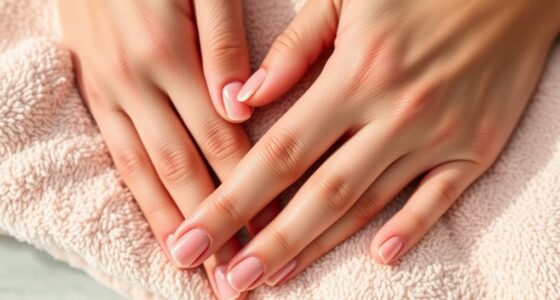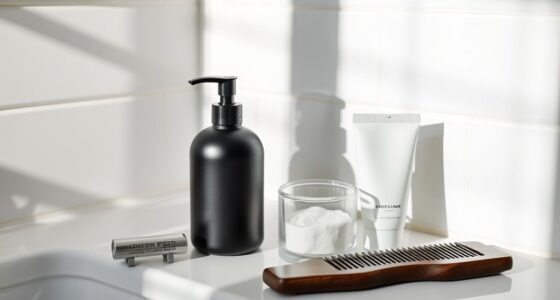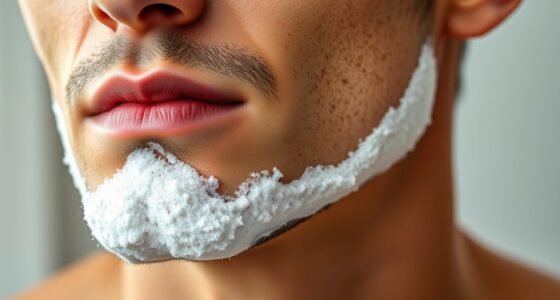To prevent ingrown hairs on your face and neck, start by softening your skin with warm water or a compress before shaving. Use a sharp, clean razor and shave in the direction of hair growth without pressing too hard. Keep your skin exfoliated regularly with mild scrubs or chemical exfoliants like salicylic acid. Wear loose clothing around your neck to reduce friction. For more tips on effectively avoiding ingrown hairs, explore the details below.
Key Takeaways
- Exfoliate regularly with gentle scrubs or chemical exfoliants to remove dead skin and prevent hair from becoming trapped.
- Shave in the direction of hair growth using a sharp, clean razor to reduce irritation and ingrown hairs.
- Soften skin with warm water or compress before shaving to minimize pulling and skin trauma.
- Wear loose, breathable clothing around the neck to reduce friction and irritation that can cause ingrown hairs.
- Moisturize with alcohol-free products post-shaving to soothe skin and maintain healthy, clear pores.

Ingrown hairs can be painful and unsightly, but you can prevent them with simple grooming practices. The key lies in understanding how your shaving techniques and skincare routines impact hair growth and skin health. When you shave your face and neck, you’re essentially encouraging hair to grow back in a way that can sometimes curl into the skin, leading to ingrown hairs. By adjusting your shaving habits, you can considerably reduce this risk.
First, focus on your shaving techniques. Always start by softening your hair and skin with warm water or a warm compress before shaving. This makes hair easier to cut and minimizes irritation. Use a sharp, clean razor to guarantee a close shave without dragging or tugging at the hair. Dull blades can cause trauma to the skin, increasing the chance of hairs growing back inward. When shaving, go with the grain—shave in the direction of hair growth—to reduce irritation and prevent hairs from curling back into the skin. Avoid pressing too hard; let the razor do the work. Rinsing your razor frequently during your shave keeps the blades clean and effective. Once you’ve finished, rinse your face and neck with cool water to close the pores, which helps prevent bacteria from entering and causing infections that can worsen ingrown hairs.
Start by softening skin with warm water, use a sharp razor, shave with the grain, and rinse frequently.
Your skincare routines also play an essential role in preventing ingrown hairs. After shaving, apply a gentle, alcohol-free moisturizer to soothe your skin. Exfoliating regularly with a mild scrub or chemical exfoliant helps remove dead skin cells that can trap hairs beneath the surface. This step is critical because buildup of dead skin can block hair follicles, forcing new hairs to grow sideways or curl inward. Using products with ingredients like salicylic acid or glycolic acid can keep your pores clear and promote healthy hair growth. Incorporating proper skincare routines can significantly reduce irritation and inflammation, further preventing ingrown hairs. Consistent skincare not only reduces irritation but also enhances the overall health of your skin, making it less prone to developing ingrown hairs.
Additionally, avoid shaving too frequently or too closely if your skin tends to be sensitive. Give your skin time to recover between shaves, and consider trimming longer hairs before shaving to reduce pulling and irritation. Wearing loose, breathable clothing around your neck can also lessen friction and irritation that might trigger ingrown hairs.
Frequently Asked Questions
Can Ingrown Hairs Be Caused by Shaving or Waxing?
Yes, shaving or waxing can cause ingrown hairs. Poor shaving techniques, like shaving too close or against the grain, can irritate hair follicles and lead to ingrown hairs. Waxing risks include pulling hair out at an angle that encourages it to grow back into the skin. To minimize this, use proper shaving methods, exfoliate regularly, and consider professional waxing to reduce irritation and ingrown hairs.
Are There Specific Skincare Products That Help Prevent Ingrown Hairs?
Think of your skin as a garden needing gentle care. You should use skincare products with salicylic acid or glycolic acid, which act like sunlight, helping to prevent ingrown hairs. Incorporate moisturizing routines and gentle exfoliation techniques to keep your skin smooth and clear. These products and practices work together, opening pores and reducing hair curling back into the skin, much like a well-tended garden stays healthy and vibrant.
How Long Does It Take for an Ingrown Hair to Heal?
An ingrown hair typically takes about 1 to 2 weeks to heal, depending on the severity and your skin’s inflammatory response. You’ll notice the healing time start once the inflammation subsides and the hair breaks through the skin or gets reabsorbed. To speed up healing, avoid picking at the area, keep it clean, and use soothing products. Proper care minimizes inflammation and promotes faster recovery.
Is It Safe to Squeeze or Pick at Ingrown Hairs?
It’s not safe to squeeze or pick at ingrown hairs because squeezing dangers can worsen inflammation, cause infections, and lead to scars. Picking risks include pushing bacteria deeper, increasing redness, and making the area more irritated. Instead, let the ingrown hair come to the surface naturally or gently exfoliate to help it along. If it becomes painful or infected, see a dermatologist for proper treatment.
Do Certain Skin Types or Conditions Increase Ingrown Hair Risk?
Did you know that people with sensitive skin or hormonal fluctuations are 30% more prone to ingrown hairs? Skin sensitivity can cause inflammation, making hairs more likely to curl back into the skin. Hormonal changes can increase oil production, clogging pores and raising risk. If you have sensitive skin or experience hormonal shifts, you should adopt gentle exfoliation and avoid harsh products to reduce your chances of ingrown hairs.
Conclusion
By following these simple steps, you can keep ingrown hairs at bay like a skilled gardener tending delicate blooms. Think of your face and neck as a canvas, and gentle care as your brushstroke to smoothness. With patience and consistency, you’ll prevent those stubborn hairs from creeping back, leaving your skin as clear and radiant as a sunlit morning. Embrace these habits, and watch your skin blossom into its healthiest, most confident self.









